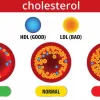How Does Diet Impact Triglyceride Levels in the Blood?
Triglycerides are a type of fat that circulates in the bloodstream. They are essential for providing energy to the body, but high levels of triglycerides can increase the risk of heart disease and other health problems. Diet plays a significant role in regulating triglyceride levels in the blood. In this article, we will explore how different dietary factors can impact triglyceride levels and provide some tips for maintaining a healthy diet.
Understanding Triglycerides
Before we delve into the impact of diet on triglyceride levels, let’s briefly understand what triglycerides are and why they matter. Triglycerides are the primary form of fat in the body and are derived from the foods we eat. When we consume more calories than our body needs for immediate energy, the excess calories are converted into triglycerides and stored in fat cells for later use. Triglycerides are released into the bloodstream when the body needs energy between meals.
The Role of Diet in Triglyceride Levels
- Consumption of unhealthy fats: Diets high in saturated fats and trans fats can significantly increase triglyceride levels. These unhealthy fats are commonly found in fried foods, fatty meats, full-fat dairy products, and processed snacks. It is important to limit the intake of these fats and opt for healthier alternatives such as lean proteins, low-fat dairy, and plant-based oils like olive oil.
- Excessive sugar and refined carbohydrates: Diets high in sugary foods and refined carbohydrates like white bread, pasta, and sugary beverages can raise triglyceride levels. When we consume these foods, they are quickly broken down into glucose, which can lead to an increase in triglyceride production. Choosing whole grains, fruits, and vegetables as carbohydrate sources can help manage triglyceride levels.
- Alcohol consumption: Alcohol is metabolized by the liver, and excessive alcohol consumption can lead to an increase in triglyceride production. It is advisable to limit alcohol intake and choose healthier alternatives like water or herbal tea.
- Omega-3 fatty acids: Including foods rich in omega-3 fatty acids, such as fatty fish (like salmon, mackerel, and sardines), walnuts, flaxseeds, and chia seeds, can help lower triglyceride levels. Omega-3 fatty acids have anti-inflammatory properties and can reduce triglyceride production in the liver.
- Fiber intake: Consuming an adequate amount of dietary fiber, found in fruits, vegetables, whole grains, and legumes, can help regulate triglyceride levels. Fiber helps slow down digestion and absorption, preventing rapid spikes in blood sugar and subsequent triglyceride production.
- Weight management: Maintaining a healthy weight through a balanced diet and regular physical activity is crucial for managing triglyceride levels. Excess body weight, particularly around the waistline, can contribute to elevated triglyceride levels.
Fitpaa App: Your Partner in Achieving a Healthy Diet
Fitpaa is an innovative app that can assist you in achieving your health and fitness goals, including managing your diet to maintain healthy triglyceride levels. The app offers personalized diet plans and guidance tailored to your specific needs. Here’s how Fitpaa can help:
- Metabolism Assessment: Fitpaa’s advanced technology allows you to assess your metabolism, identifying any underlying factors that may be impacting your triglyceride levels. This assessment provides valuable insights into your body’s unique needs.
- Personalized Fitpaa Capsule: Based on your metabolism assessment, Fitpaa’s team of nutritionists and doctors will create a personalized Fitpaa Capsule for you. This capsule includes a sustainable diet plan that takes into account your dietary preferences, lifestyle, and Indian food habits.
- Diet Tracking and Guidance: Fitpaa’s app includes a precision diet tracker that helps you monitor your food intake, ensuring you stay on track with your personalized diet plan. The app provides real-time guidance on the number of calories you should consume to support your goals.
- Expert Support: Fitpaa offers unlimited consultations with nutritionists and fitness planners who will provide continuous support, feedback, and motivation. They will review your progress regularly and make necessary adjustments to your diet plan to ensure you achieve your goals.
- Lifetime Validity: Fitpaa’s services come with lifetime validity, meaning once you achieve your triglyceride level goals, you can continue using the app to maintain a healthy diet and overall well-being.
Conclusion
Maintaining healthy triglyceride levels is essential for overall health and well-being. By incorporating a healthy diet that limits unhealthy fats, sugar, and alcohol while emphasizing omega-3 fatty acids, fiber, and weight management, you can effectively manage triglyceride levels. The Fitpaa app can be your trusted companion in achieving your health goals, providing personalized guidance, and supporting you every step of the way. Download the Fitpaa app today and embark on your journey to better health and a balanced diet.









